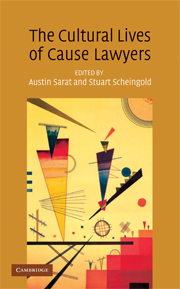Book contents
- Frontmatter
- Contents
- Acknowledgments
- Contributors
- Bringing Cultural Analysis to the Study of Cause Lawyers: An Introduction
- PART I THE CULTURAL WORK OF CAUSE LAWYERS
- 1 “No sacrifice is too great for the Cause!”: Cause(less) Lawyering and the Legal Trials and Tribulations of Gone With the Wind
- 2 Purpose-Driven Lawyers: Evangelical Cause Lawyering and the Culture War
- 3 Cause Lawyers and Cracker Culture at the Constructive Edge: A “Band of Brothers” Defeats Big Tobacco
- PART II THE CULTURAL CONSTRUCTION OF LAWYERS AND THEIR CAUSES
- PART III THE CULTURAL RECEPTION OF LAWYERS AND THEIR CAUSES
- Index
2 - Purpose-Driven Lawyers: Evangelical Cause Lawyering and the Culture War
Published online by Cambridge University Press: 08 January 2010
- Frontmatter
- Contents
- Acknowledgments
- Contributors
- Bringing Cultural Analysis to the Study of Cause Lawyers: An Introduction
- PART I THE CULTURAL WORK OF CAUSE LAWYERS
- 1 “No sacrifice is too great for the Cause!”: Cause(less) Lawyering and the Legal Trials and Tribulations of Gone With the Wind
- 2 Purpose-Driven Lawyers: Evangelical Cause Lawyering and the Culture War
- 3 Cause Lawyers and Cracker Culture at the Constructive Edge: A “Band of Brothers” Defeats Big Tobacco
- PART II THE CULTURAL CONSTRUCTION OF LAWYERS AND THEIR CAUSES
- PART III THE CULTURAL RECEPTION OF LAWYERS AND THEIR CAUSES
- Index
Summary
Introduction
The trappings of a typical lawyer's office – legal texts on a shelf, files here and there, a diploma on the wall – were scarcely evident when I visited a prominent evangelical attorney in his office in 1999. He devoted less desk space to legal work than to bobble heads and plastic figurines from popular films and television. A large poster of Bob Dylan hung on the wall behind his chair. A mask of then-President Clinton sat on a bust on a nearby table, topped with a Rastafarian wig. His bookshelf was as likely to display Kerouac or Tolstoy as Black's Law Dictionary. Indeed, the office was doubly dissonant: not only did it flaunt lawyerly conventions but it also belied the stereotype of the evangelical as withdrawn from the broader culture. The entire scene appeared as a paean to mass culture, and in some respects our interview confirmed the impression. The attorney was clearly immersed in modern art, music, and literature.
Yet his exposure to these cultural expressions was not without a critical edge; I discovered very soon into our interview that the artifacts around him represented his own cultural ambivalence. On the one hand, he was fascinated intellectually by modern culture and enjoyed experiencing it. On the other hand, he envisioned that culture as reinforcing a perspective about the human condition that was both deeply flawed and dangerously influential.
- Type
- Chapter
- Information
- The Cultural Lives of Cause Lawyers , pp. 56 - 78Publisher: Cambridge University PressPrint publication year: 2008
- 4
- Cited by



